GOWE 3KW grid tie wind turbine generator
 | GOWE 3KW grid tie wind turbine generator | |
| Read more |  | |
15watt Wind Turbine
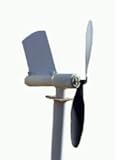 | "Cyber 15 high speed wind turbine generators built entirely within the USA.
- Produces 14V DC and .75 amps in 40 mph winds (output increases as wind speed increases).
- Compact; measuring about 10"" long and utilizing a 2-blade 12"" propeller. It weighs about 12 oz.
- Very quiet even though it easily turns over 1000 rpm in 25 mph winds (verified with an optical tachometer)." | |
| Read more |  | |
RISING 600W AC 24V Wind Turbine Generator 6 Blades Carbon Fiber With Wind Charge Controller
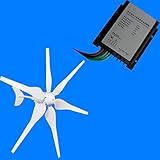 | RISING 600W AC 24V Wind Turbine Generator 6 Blades Carbon Fiber With Wind Charge Controller
Model: SG-600W
Rated power:400w
Rated DC voltage: DC 24V
Output: AC output wind turbine
Rated current: 33A/17A
Rated speed: 900r/m
Max power: 600W
Number of blade: 6 pcs
Starting wind speed: 2.5m/s
Cut-in wind speed: 3.5m/s
Cut-out wind speed: 15m/s
Security wind speed: 40m/s
Rated wind speed: 12.5m/s
Engine (generator): permanent mangle generator
Rotor diameter: 1140mm
| |
| Read more |  | |
Faller 130381 Wind Turbine Generator with Motor Era V
 | Made in Germany. Kits may require assembly. Figures are not included. | |
| Read more |  | |
GTSUN 1000W Wind Grid Tie Power Inverter Converter For 3phase Wind Turbine Generator System AC 22V- 60V
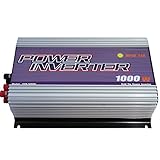 | GTSUN 1000W Wind Grid Tie Power Inverter Converter For 3phase Wind Turbine Generator System AC 22V- 60V LCD display
Model :GTI-W1000
Normal AC Output Power:900W
Maximum AC Output Power :1000W
AC Output Voltage Range: 90-140V
AC Output Frequency Range: 46Hz ~ 65Hz
Total Harmonic Distortion(THD):below5%
Power Factor:0.99
AC Input Voltage Range:22V-60V(The test point is at the output of the rectifier)
Peak Inverter Efficiency:90%(The consumption of the rectifier is not calculated.)
St | |
| Read more |  | |
ALEKO® Power Inverter 3000 Watt 48V to 120V
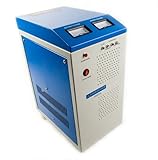 | ALEKO® brand new 3000 watt power inverter 48V to 120V. Comes with Overload protection and Low-voltage protection functions. | |
| Read more |  | |
Your Questions About Wind Turbine

George asks…
What would be a good wind turbine to put on a Toyota Prius?
For a science fair project, I want to put a wind turbine on top of my father’s Prius to see whether or not the mileage would improve. What would be a good wind turbine to do that with? Do you have any other tips for my experiment?

admin answers:
The answer is that the mpg would decrease–probably by a lot. The reason is that the gas engine will have to create the wind to run the wind turbine. So basically you’re going to have an energy conversion losses by converting from gas to wind to electricity. But it will be worse than that because there is also the additional drag of the wind turbine parts.
I don’t know what kind of wind turbine you could use.
Now what would work is to add battery packs to the Prius and have a stationary wind turbine charge these packs. However, because the Prius battery packs are over 200V it’s not a safe thing to do unless you are qualified to work on high voltage equipment. There is also the battery ECU to worry about. Somehow you will need to tell it what you are putting into it.

John asks…
What is the best wind turbine for my situation?
I use around 25000 kWh of electricity each year, which wind turbine would be best suited to meet all of my energy needs with an average wind speed of 20mph.

admin answers:
Hey Kevin, I think people are avoiding answering this because the question is too nebulous, I’ll explain. 25,000 kwh per year, or about 2000 per month is quite a larege number for a residence, are you running a business? Our home uses 300 – 350 per month, a bit below the average for a 2400 square foot single family dwelling. Trying to get answers on this with usage and average wind speed is like me asking you what kind of car should I get, I live about 12 km from work. Any car can get there, but do I need cargo space, winter driving capabilities, do I have kids? And so on. We use a 900 watt Southwest Windpower model H-40, it is probably a bit too small for our home, something on the order of 1500 watts would work better, but we over did the solar array at 1.4kw, and in the end we make about 90% of our electricity, the other part comes from the power company.
Wind turbine output is a function of the cube of the wind speed. If you double the wind speed, you can theoretically get 8 times the power out of the turbine. But then some turbines have ideal design wind speed higher than others, so a lighter wind turbine in heavy winds will actually degrade from its power curve on a good day. Our site has really good wind in the fall and winter, and really good sun in the spring and summer, so solar and wind complement each other here. This is basically true of most places, just getting the turbine might be disappointing in the end. Three bladed units work better in gusty shifting winds, but are less efficient in lighter winds than 2 bladed ones. When you say your average wind speed is 20 mph, is it 20 most the time, or 5 mph for 3 days, then 40 mph on day 4? This makes a big difference in turbine selection.
What I’m really getting at is this isn’t a question for hacks like me online. In the 12 years we have been using solar and wind power, and teaching renewable energy at our local schools, I’ve learned that there are three things in vast supply, sun, wind, and missinformation. There are better ways to get informed on this subject than here, I will list some sources below to start you out. My first suggestion is to get a subscription to Home Power Magazine. They are the only periodical that get into the nuts and bolts of this subject. Then when the first issue arrrives, look in the calendar section for an energy fair near you. We subscribed 13 years ago, and went to the fair in Wisconsin in June that same year. Here we are today. It would be so easy for someone like yourself to buy into a machine that does not work well for your site, but works very well for the installer to make money with, trust me on this.
Check out the sources below, try to make one of the energy fairs, and then you’ll be in a position to ask some really good questions. Good luck Kevin, and take care, Rudydoo
Powered by Yahoo! Answers
iMeshbean® 250W 300W 500W 600W 1000W 2500W Grid Tie MPPT Power Inverter Converter for Solar Panel and Wind Turbine Generator System Stackable Pure Sine Wave USA (1000W Wind Input 22 – 60V AC)
 | • There are 5 terminals on the left side of the inverter, 3 red terminals will be connected to the three phase output from the wind turbine, and 2 black terminals will be connected to dump load resistors. | |
| Read more |  | |
Wind Turbine Technology
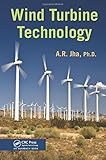 | Highlighting the capabilities, limitations, and benefits of wind power, Wind Turbine Technology gives you a complete introduction and overview of wind turbine technology and wind farm design and development. It identifies the critical components of a wind turbine, describes the functional capabilities of each component, and examines the latest performance parameters and procurement specifications for these components. From cutting-edge design aspects to experimental data, this comprehensive re | |
| Read more |  | |
Aleko R3 Light- Medium Duty Roof Pole for Wind Generator Top-Roof Mount Tower for Wind Turbine 4 Feet
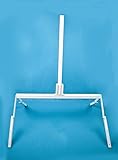 | The ALEKO® R3 Wind Generator Light-Medium Duty Tower Kit supports wind generators, such as ALEKO® WG100, WG200, WG300, WG400, WG450, WG500, WG700, WG800, WG900 Wind Generator. Pole diameter: Inside 1 5/8" outside 1 7/8"inches. This all-weather tower kit is easy to assemble, and an excellent choice for almost any portable wind generator. | |
| Read more |  | |
GudCraft WG400X 400 Watt 12-Volt 6-Blade Wind Generator With Charge Controller
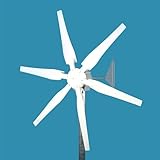 | WG400 GudCraft 400W Wind Generator is a low wind speed, small-size wind generator with starting speed just 5mph or more. | |
| Read more |  | |
ALEKO® WG700 12-Volt 3-Blade 700 Watt Wind Generator
 | 700 Watt 12 Volt system uses wind to generate power and run your appliances/electronics Wind turbines include generator, 3 blades, tail, screws/bolts and Free Controller. Constructed from lightweight, weatherproof cast aluminum 1-Year Warranty Latest 2011 design with 3 new blades. Charge controller is optional and not included. | |
| Read more |  | |
GOWE small wind turbine generator 50w home windmill with 3 PCS blades
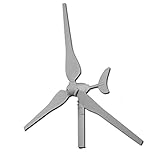 | GOWE small wind turbine generator 50w home windmill with 3 PCS blades | |
| Read more |  | |
GOWE wind power turbines 5blades 400w ,Max 600w wind generators + small wind controller 12v/24v auto change for home ,street lamp
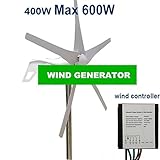 | GOWE wind power turbines 5blades 400w ,Max 600w wind generators + small wind controller 12v/24v auto change for home ,street lamp | |
| Read more |  | |
GOWE off grid forest controlling system build with 600w wind turbines generator +300w solar panel +controller
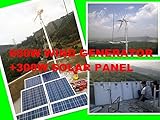 | GOWE off grid forest controlling system build with 600w wind turbines generator +300w solar panel +controller | |
| Read more |  | |
Your Questions About Wind Turbine Generators Australia

John asks…
how many wind turbines are there in wa?
i need this for a class assignment how many wind powered electrical generators are there in wa

admin answers:
I don’t know of any wind farms in West Australia yet; but there would be good sites for them to the south, exposed to the roaring forties winds. There are several wind farms in South Australia and Victoria, taking advantage of the reliable winds in the Great Australian Bight and Bass Strait.
Or are you referring to Washington State?

David asks…
what are the conventional and non-conventional sources of renewable energy?

admin answers:
Solar Energy
Solar energy is light and heat energy from the sun. Solar cells convert sunlight into electrical energy. Thermal collectors convert sunlight into heat energy. Solar technologies are used in watches, calculators, water pumps, space satellites, for heating water, and supplying clean electricity to the power grid. There is enough solar radiation striking the surface of the earth to provide all of our energy needs.
There are two main ways of using solar energy to produce electricity. These are through the use of solar cells and solar thermal technology. Using solar technologies to generate electricity is, at present, more expensive than using coal-fired power stations, but it produces much less pollution.
Solar cells are photovoltaic cells that turn light into electricity. Solar cells are used in three main ways. They are used in small electrical items, like calculators, and for remote area power supplies, like telephones and space satellites. They are also used on a larger scale to supply electricity through energy authorities such as energex and Ergon.
Solar cells are used to a limited extent in the development of solar-powered vehicles. Solar thermal technology uses heat gained directly from sunlight. The best known use of this technology is in solar water heating. Solar thermal electric generating plants use reflectors to collect heat energy to make steam which drives a turbine that produces electricity.
Australia is in an ideal position to develop and use solar energy. Some areas in central and western Queensland are among the best sites in the world to develop large scale solar electric generating plants.
Wind Energy
Moving air turns the blades of large windmills or generators to make electricity, or to pump water out of the ground. A high wind speed is needed to power wind generators effectively. While wind generators don’t produce any greenhouse gas emissions they may cause vibrations, noise and visual pollution.
While wind-generated electricity does not cause air pollution, it does cost more to produce than electricity generated from coal.
Wind pumps and generators have been used in remote areas of Australia and in other countries around the world for many years. More recently, wind turbo-generators on wind farms have been providing electricity for cities and towns in more than a dozen countries. The United States of America and Denmark produce most of the world’s wind-generated electricity. Australia has some small wind farms. The largest of these is at Esperance in Western Australia.
In Queensland, wind farms operate at Atherton Tablelands and Thursday Island.
A large wind turbo generator needs a minimum annual average windspeed of about 25 km/h. Sites need to be clear of tall vegetation and are often on prominent hills and headlands or in coastal areas. The southern states in Australia are in a good position to use wind generators because of a strong wind called the ‘roaring forties’ that blows across the south of the continent.
Large wind generators can be more than 110 metres tall with blades spanning 130 metres. They can sometimes make a low-frequency sound that cannot be heard by humans, but which can rattle windows. Wind farms can be a danger to migrating birds flying at night and can cause TV and radio interference in nearby homes. Because of their size, some people think wind generators are ugly and spoil the scenery, however in some places they are a tourist attraction.
Tidal/Wave Energy
If a dam or barrage is built across a river mouth or inlet, electricity can be obtained by the flow of water through turbines in the dam as the tide rises and falls. The movement of waves can also drive air turbines to make electricity. Although tidal and wave energy don’t produce pollution, they can cause other environmental problems.
Biomass Energy
Biomass is plant and animal material that can be used for energy. This includes using wood from trees, waste from other plants (for example, bagasse from sugar cane) and manure from livestock. Biomass can be used to generate electricity, light, heat, motion and fuel. Converting biomass energy into useable energy has many environmental benefits. It uses waste materials that are usually dumped, and uses up methane (a greenhouse gas). Fuels such as ethanol can be made from biomass and used as an alternative to petrol to power motor cars.
All plant and animal matter is called biomass. It is the mass of biological matter on earth. We can get (biomass) energy:
Directly from plants, for example burning wood for cooking and heating. O Indirectly from plants, for example turning it into a liquid (alcohol such as ethanol) or gas (biogas) fuel.
Indirectly from animal waste, for example biogas (mainly methane gas) from sewage and manure.
An increasing number of renewable energy projects using biomass has been developed. Most of these use waste products from agriculture, so they solve a waste disposal problem and, at the same time, create energy for use in homes, farms and factories.
Logan City Council collects biogas from a landfill site at Browns Plains, and uses it to generate electricity. Four companies in Ipswich are working together to use energy from landfill biogas. The biogas will be processed and piped to nearby Swanbank Power Station.
Biogas can also be produced from livestock manure and human sewage. Farms where animals graze and sewage plants are ideal places to produce energy from biogas. Waste peelings from food processing plants can also be used to produce biogas.
An example of agricultural waste being used to produce electricity is the recent Mackay Sugar Cooperative Association bagasse project. Bagasse (solid waste from sugar production) from four mills will be processed and used instead of coal to produce electricity.
Hydroelectric Energy
Fast-flowing water released from dams in mountainous areas can turn water turbines to produce electricity. While it doesn’t cause pollution, there are many other environmental impacts to consider. Ecosystems may be destroyed, cultural sites may be flooded and sometimes people need to be resettled. There are also impacts on fish breeding, loss of wildlife habitat and changes in water flow of rivers.
Hydroelectricity is produced from falling water. The movement of the water spins turbines which generate electricity.
Places with high rainfall and steep mountains are ideal for hydroelectricity. Canada, Brazil and New Zealand produce most of their electricity this way. In Australia about 8 per cent of electricity is produced from hydroelectricity. Most of this is from the Snowy Mountains Scheme in New South Wales. Queensland has two hydroelectric power stations in the Barron Gorge and Kareeya in far north Queensland.
Most hydroelectricity projects require the building of large dams on rivers, which can be very expensive. When large dams are built the flow of the dammed river is changed radically and large areas of land are flooded, including wildlife habitats and farming land.
Because of the environmental impact of traditional hydroelectric schemes, there has been increasing interest in alternative hydro schemes. Pumped storage systems can be installed on existing dams. There is a pumped storage hydroelectric power station at Wivenhoe Dam, west of Brisbane.
Run-of-river hydroelectric schemes cause less environmental damage. Large dams do not need to be built, as the run-of-river schemes divert only part of the river through a turbine.
Geothermal Energy
Geothermal energy uses heat energy from beneath the surface of the earth. Some of this heat finds its way to the surface in the form of hot springs or geysers. Other schemes tap the heat energy by pumping water through hot dry rocks several kilometres beneath the earth’s surface. Geothermal energy is used for the generation of electricity and for space and water heating in a small number of countries.
Powered by Yahoo! Answers
SunGold Power Max 1200W wind turbine generator 24V AC 3 blades
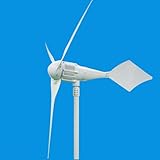 | Max 1200W wind turbine generator 24V , 3 phase wind turbine, AC output. about 50kg
Feature:
1, starting with low wind speed, high output capactiy,low vibration
2. blades using new technology precision injection molding, together with the aerodynamic design and structural design.
3. permanent magnet generator rotor using patented alternator, together with the special stator design, effectively reduce | |
| Read more |  | |
Horizon Fuel Cell Technologies HydroWind Education Kit
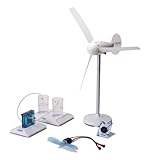 | Young engineers can invent their own clean energy applications from fuel cells and renewable hydrogen made with wind and water. Includes a real wind turbine which can inspire kids get to develop their own applications using a zero-carbon fuel. Hydro WindPitch also features LED Voltmeter/Music Maker Module to demonstrate the power created from the wind energy in the form of musical sounds and illuminated LED lights. Includes a complete guide with curriculum on wind energy and fuel cells, an easy- | |
| Read more |  | |
GTSUN 1500W Wind Grid Tie Power Inverter Converter For Wind Turbine Generator System AC input 45V- 90V
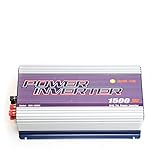 | GTSUN 1500W Wind Grid Tie Power Inverter Converter For Wind Turbine Generator System AC input 45V- 90V
Model :GTI-W1500
Normal AC Output Power:1450W
Maximum AC Output Power :1500W
AC Output Voltage Range:
220V/230V/240V 190V-260V
100V/110V/120V 90-140V
AC Output Frequency Range: 46Hz ~ 65Hz
Total Harmonic Distortion(THD):below5%
Power Factor:0.99
AC Input Voltage Range:45V-90V(The test point is at the output of the rectifier)
Peak Inverter Efficiency:92%(The consumption of the rec | |
| Read more |  | |
ECO-WORTHY 700Watt Output Hybrid Kit: 400W Wind Turbine Generator & 300W Mono Solar Panels
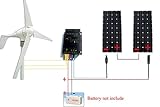 | Specification:
1. 160W mono solar panel
Related power: 160W
Voc: 22.41V
Vop: 17.9V
Short circuit current (Isc): 9.87A
Working current (Iop): 8.89A
Temperature range: -40℃to +80℃
Frame: Heavy duty aluminum
SLA Battery Voltage: 12V
Size(inch): 58.2*26.6*1.4
2. 400W Wind Turbine Generator
Rated Power: 400W
Nominal Voltage: DC12-24V
Cut-in Wind Speed: 2.5m/s
Rated wind speed: 10.5m/s
Maximum wind speed: 35m/s
Rated Rotate Speed: 800r/min
battery capacity: 200AH-400AH
Fan bla | |
| Read more |  | |
